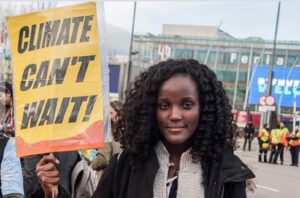By Lisa Vives, Global Information Network
NEW YORK (IDN) — In a sharply-worded letter aimed at media leaders and chief editors prior to the UN Climate Change Conference now taking place in Glasgow, Scotland, young woman activist Vanessa Nakate of Uganda spared the politeness and highlighted today’s calamities in her part of the world.
“Melting glaciers, wildfires, droughts, deadly heat waves, floods, hurricanes, loss of biodiversity. These are all symptoms of a destabilizing planet, which are happening around us all the time,” she said in a letter co-authored with activist Greta Thunberg of Sweden.
“The climate crisis isn’t just about extreme weather. It’s about people. Real people. And the very people who have done the least to create the climate crisis are suffering the most.
“Those are the kind of things you report about —sometimes,” Nakate reminded the media community. “The climate crisis, however, is much more than just this. If you want to truly cover the climate crisis, you must also report on the fundamental issues of time, holistic thinking and justice.”
Nakate recalled walking with a friend through central Kampala last month when they saw a police truck go by, a body in the back.
“It’s a sight that has become more common in Uganda,” Nakate said. “The life of that person, and many others, was taken by a heavy downpour in my home city. Uganda has been battered by floods in recent years, as well as droughts and plagues of locusts. So much has been damaged and lost as a result of the climate crisis.”
“I believe in the “polluter pays” principle,” she declared. “We know who did this—but they don’t want to pay the bill. Rich countries providing finance only for the mitigation of our emissions and protections against future impacts is no longer enough. Climate-vulnerable countries need funds to deal with the damage we are suffering now.”
Nakate, 24, is the author of A Bigger Picture: My fight to bring a new African voice to the climate crisis. Her words were backed up by Malawi President, theologian and chair of the Southern Africa Development Community, Lazarus Chakwera.
Chakwera scolded rich countries. “If countries with the greatest capacity to effect change but do not, those with more modest means should not be expected to do so. At COP26, the West must show it is now fit for the challenge and will finally fulfill its obligations.
“If you’ve been involved in bringing the earth we call home to this state, let’s clean it up, but you have to be responsible. Your $100 billion climate pledge in 2009 to help poor countries deal with climate change each year is not a matter of charity,” he said. “So pay up or perish with us,” he declared.
Finally, among the many young people at the conference, 26-year-old Elizabeth Wathuti of Kenya, founder of Green Generation Initiative, expressed a widely shared view.
“One of my key expectations was to see more action instead of going to these forums and hearing talks, talks, talks for the next years. My thought was, COP26 is coming up, and to me this translates into 26 years of inaction… Youth from Africa, Asia and Latin America make up 90 percent of the total Global youth population”, she said, “but the focus on youth in Europe, North America, and Australia remains most prevalent.”
“We felt so many times as though we were being ignored or not being listened to at all. Because if we were being listened to, then we would be fully represented in this global climate conversation…
“It has been a struggle, but I really hope as we continue to use our voices to speak up for our countries, for our people, the world will begin to pay attention.” [IDN-InDepthNews – 31 October 2021]
Photo: Young woman activist Vanessa Nakate. Source: Global Information Network


